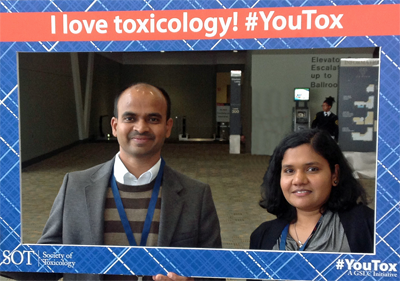SOT Student member Ramiya Kumar, BS, is a doctoral candidate in the Clemson University Department of Biological Sciences. Ms. Kumar is pictured with her mentor, Vijaykumar P. Kale, PhD, DABT, ERT, who she met through the SOT Association of Scientists of Indian Origin Special Interest Group (ASIO) during the 2016 SOT Annual Meeting and ToxExpo. Dr. Kale is a toxicologist with Battelle Memorial Institute who has served on the leadership teams of the SOT Biotechnology Specialty Section, SOT Graduate Student Leadership Committee, and ASIO during his affiliation with the Society.
 What is your area of work/research?
What is your area of work/research?
Ms. Kumar: My research is to study the role played by cytochrome p450 in hepatic lipid metabolism with an overarching goal to look at cytochrome p450’s role in metabolic diseases such as non-alcoholic fatty liver disease, obesity, and diabetes.
Dr. Kale: Though my primary area of interest is drug discovery toxicology, I conduct animal toxicity studies for environmental pollutants, chemicals, and food ingredients, apart from novel drug candidates either for commercial or government clients.
How did you become interested in toxicology?
Ms. Kumar: My earlier work experience in a research and development division within the pharmaceutical industry developing eco-friendly enzymatic production processes to replace chemical processes had me thinking about interactions between chemicals and our diets: Can we prioritize what gets metabolized and when? I joined Dr. William Baldwin’s laboratory, where in we developed knock-out mouse models to tease out physiological changes that happen in response to chemicals and diet.
Dr. Kale: Initially, I entered in the drug discovery area as a veterinary pathologist. Slowly, my curiosity extended to the toxicology field, which compelled me to pursue a PhD in toxicology. I love toxicology because with this science I can contribute towards keeping society healthier and safer whether I work on novel drugs, environmental pollutants, or food ingredients. The field of toxicology will welcome you irrespective of your educational background. Whether you are a biologist, chemist, physicist, engineer, physician, veterinarian, or a zoologist, you have a significant role to play in the field of toxicology and contribute towards making this world a safer place to live.
What has been your favorite moment or experience while pursuing your scientific career?
Ms. Kumar: My favorite moment was when we observed differences in mouse behavior along with the expected macro-molecular responses in my mouse models, which led us to explore a whole new area related to diet and behavioral changes during metabolic disease.
Dr. Kale: There are many exciting and favorite moments so far, but the most notable moment for any drug discovery toxicologist is to see the drug which you worked on reach the patients. And fortunately, I had that opportunity!
If you were not a scientist, what would you be and why?
Ms. Kumar: I would have been a full-time dancer, choreographing some unique dance moves rather than choreographing mind-blowing science experiments😝.
Dr. Kale: Now I can’t imagine that! But maybe a civil servant or educator.
Dr. Kale, any advice for future scientists?
If you are interested in pursuing your career in the field of toxicology, getting actively involved in SOT and identifying the right mentors early in your graduate studies will tremendously help you in long run. Learn new techniques and technologies, network with other toxicologists, and volunteer for leadership roles in SOT and at your school.
Through #YouTox, the Graduate Student Leadership Committee (GSLC) invites individuals, labs, communities, and organizations to share stories, images, videos, and other media that help shed a light on toxicology and toxicologists. To join the campaign, use #YouTox on social media channels (Facebook, Twitter, Instagram, etc.) or email your submission to Ashley Black, SOT GSLC staff liaison.